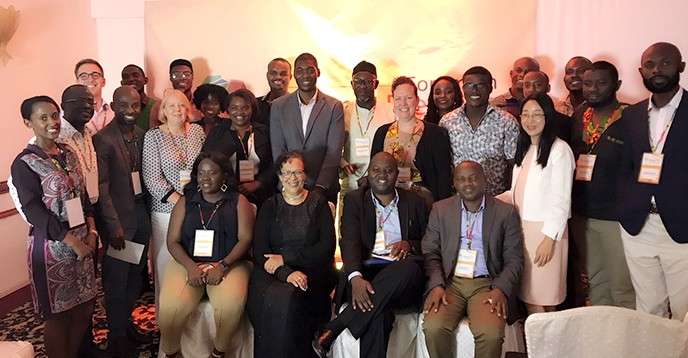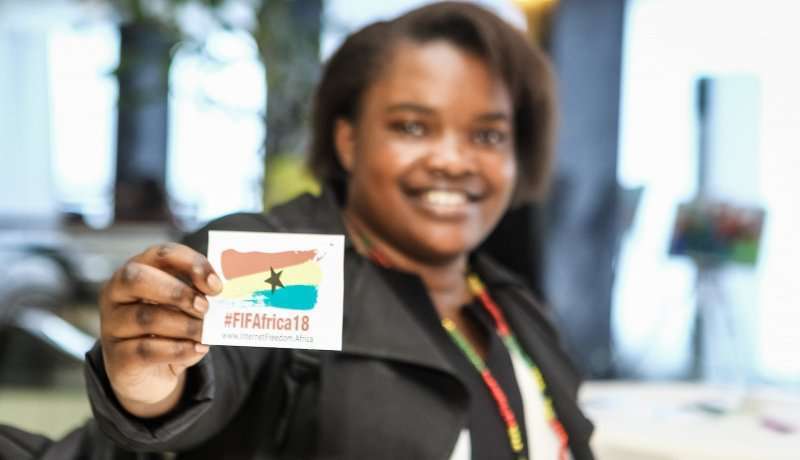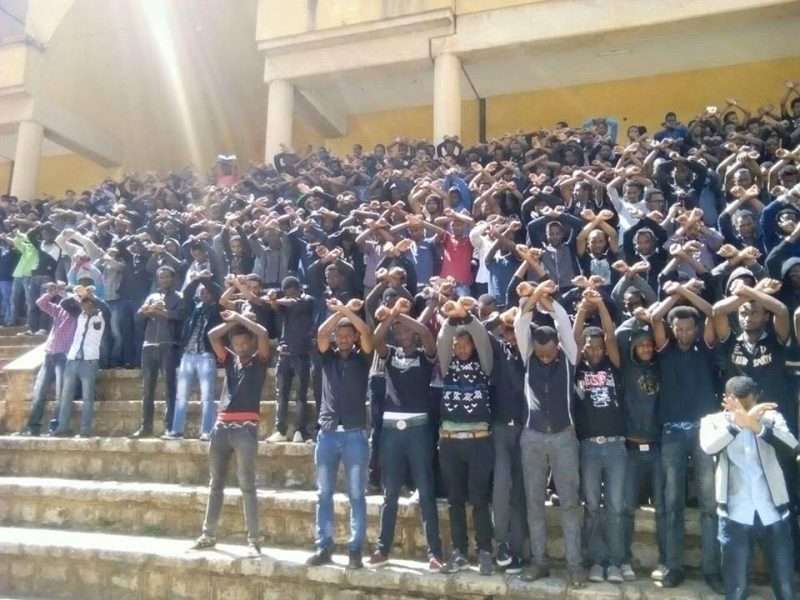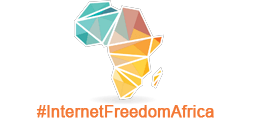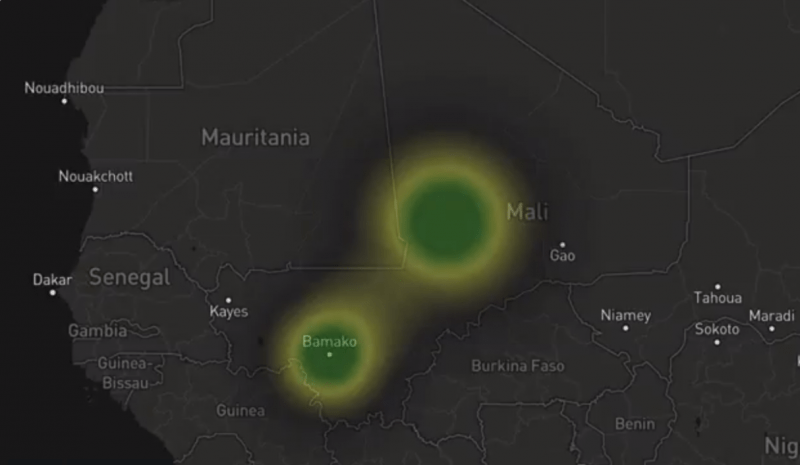FIFAfrica18 Update |
Du 26 au 28 septembre 2018 se tenait à Accra la 5è édition du Forum on Internet Freedom in Africa (FIFAfrica), auquel participait Internet Sans Frontières. J’ai eu le privilège d’y représenter l’association. Co- organisé par le Collaboration on International ICT Policy for Eastern and Southern Africa, un organisme consultatif indépendant, et la Media Foundation for West Africa, ce forum se veut un haut lieu d’échanges entre différents acteurs sur l’état et les perspectives des libertés et droits numériques en Afrique.
Les Taxes sur l’utilisation des réseaux sociaux au cœur des discussions
Il a évidemment été question des législations visant à taxer auprès des utilisateurs l’usage des réseaux sociaux et applications de messagerie, quelques jour après qu’une régulation similaire ait été retirée au Bénin, suite à une forte mobilisation des béninois, soutenue par Internet Sans Frontières. Le panel consacré aux implications économiques et sociales des taxes sur les réseaux sociaux, auquel j’ai pris part pour Internet Sans Frontières, était modéré par Sandi Chimpala de TechTrends, aux côtés du Dr. Wairagala Wakabi de CIPESA, Broc Rademan de Research ICT Africa et Kojo Boakye de l’entreprise Facebook . Au delà de l’impact économique négatif, les panélistes ont rappelé ces taxes sont porteuse d’un relent autoritariste, en ce qu’elles font peser de réelles menaces sur la liberté d’expression, et l’accès l’information. L’occasion m’a été donnée de rappeler que la victoire historique et inédite des citoyens béninois face à leur gouvernement ne doit pas faire oublier que de nombreux utilisateurs en Ouganda, en Zambie subissent encore le poids de ces régulations injustes.

L’urgence en Afrique d’adopter des indicateurs de l’universalité de l’Internet
Internet Sans Frontières a également pris part à la session organisée par l’UNESCO sur les indicateurs de l’universalité de l’Internet : fruit d’une réflexion entamée en 2017, ces indicateurs doivent permettre à chaque pays d’auto-évaluer le niveau d’universalité de l’Internet disponible dans un territoire donné, en particulier vérifier que l’Internet est fondé sur les droits humains, s’il est ouvert, accessible à tous, et fruit de la participation de plusieurs acteurs. Aux côté de James Marenga, Vice-président de l’Institut des Médias pour l’Afrique Australe (MISA), de Damola Sogunro, Principal Computer Analyst au Ministère de la Communication et des Technologies du Nigeria et de Dorothy Gordon, activiste technologique ghanéenne et spécialiste du développement, j’ai pu rappeler
les nombreux obstacles qui entravent l’accès aux informations en ligne sur le continent Africain tels que les coupures d’Internet, la restriction des libertés et la criminalisation des discours en ligne, la faible protection de la vie privée, les taxes relatives à l’usage d’Internet et le manque de transparence par rapport aux activités des gouvernements.
Plaidoyer contre les coupures Internet et données
Le panel consacré au plaidoyer axé sur les données relatives aux coupures d’Internet en Afrique a permis de rappeler le travail d’Internet Sans Frontières contre cette forme grave de censure, aux côtés de ses partenaires Access Now, the Global Network Initiative, et Netblocks, tous membres de la coalition Keepiton fondée en 2016. Les données sont nécessaires dans cette lutte, notamment celles permettant de connaitre le nombre précis de coupures Internet, mais également l’impact économique et financier de celles-ci. En 2017, le premier calcul par Internet Sans Frontières du coût économique de la coupure totale d’Internet dans les régions anglophones du Cameroun, la plus longue à ce jour en Afrique, a permis d’intéresser un tout nouveau public au plaidoyer contre la censure sur Internet, en particulier les médias et institutions économiques et financières. D’où l’importance de l’outil COST (Cost of Shutdowns Tool), développé par l’organisation Netblocks, qui automatise le calcul du coût des coupures Internet.
FIFAfrica, un espace de discussion et de collaboration nécessaire
J’ai pu constater à travers ma participation que le FIFAfrica est un creuset qui permet de débattre de manière interactive et éclairée sur les enjeux et défis actuels de la société de l’information en Afrique.
Vous pouvez en apprendre d’avantage sur la 1ère participation d’Internet Sans Frontières à ce grand RDV africain dans ce podcast d l’émission Afrique 7 jours de la Deutsch Welle.
FIFAfrica: Responding to the Need for Stronger Advocacy on Internet Freedom in Africa
FIFAfrica |
There is rising awareness among Africa’s growing online community about the use of the internet to defend human rights, complement independent local media, strengthen democratisation, and demand accountable and transparent governance. However, there are limited avenues for Africans to participate in discussions that shape internet governance. While global convenings such as the Internet Governance Forum (IGF), the Stockholm Internet Forum (SIF, the Internet Freedom Festival (IFF) and RightsCon discuss the internet freedom landscape – including in Africa – attendance by African stakeholders is often limited.
Since 2014, the Collaboration on International ICT Policy for East and Southern Africa (CIPESA) has convened the annual Forum on Internet Freedom in Africa (FIFAfrica) to provide a pan-African space where discussion at the global level can be consolidated at Africa-wide level, drawing a large multi-stakeholder audience of actors from within and beyond the continent.
This year’s edition of FIFAfrica was held in Accra, Ghana on September 26-28, 2018. It brought together 280 participants from 47 countries to deliberate on gaps, concerns and opportunities for advancing privacy, access to information, free expression, non-discrimination and the free flow of information online on the continent. Hosted in partnership with the Media Foundation for West Africa (MFWA), FIFAfrica18 was the first to be held in West Africa. Previous Forums have been hosted in East Africa and Southern Africa.
Through panel discussions, workshops, exhibitions and lightning talks, the proceedings of FIFAfrica18 explored common strategies for impactful work in promoting internet freedom in the face of persistent affronts to the rights of African online users.
In his keynote address titled “Many African Governments Hate the Free Internet – And That Is A Very Good Thing”, veteran journalist, publisher and curator of Africapedia, Charles Onyango-Obbo noted that the Internet in Africa “had finally seized from the state narrative-making power”, making “political control difficult”. According to Obbo, governments across the continent appreciate the power of the internet hence their efforts to suppress its use. Calling for the internet’s liberation, he urged stakeholders to “get on their keyboards and fight” against the growing trend of censorship, surveillance and regulation.
This call to action resonated throughout sessions on addressing gender-based violence online; the potential of the internet for civic agency and eGovernance; the role of community networks in bridging the digital divide; safety and security for critical internet users; pushing back against internet shutdowns; local content development; curbing cybercrime; promoting online consumer rights; privacy and data protection; advocacy at global level; and fighting misinformation/fakenews, among others.
The particularly poignant state of internet freedom in some African countries was illustrated by frontline experiences shared from Ethiopia and Cameroon. The Zone 9 bloggers collective shared their plight of repression, surveillance, censorship and incarceration under Ethiopia’s repressive regime. The recent release of their members and their continued commitment to human rights advocacy in the context of Ethiopia’s ongoing reforms were perhaps the strongest indication that the spirit to fight should live on. A special edition of the Blacked Out YouTube video on the devastating internet shutdowns in Cameroon was screened at FIFAfrica and exemplified the internet’s potential to challenge and expose authoritarian rule.
In commemoration of the International Day for Universal Access to Information (IDUAI), UNESCO hosted a session on access to information through the lens of the Internet Universality Indicators. The indicators are a tool designed to enrich stakeholders’ capacity for assessing internet freedom and development, broaden international consensus, and foster access to information, online democracy and human rights. As Dorothy Gordon, Chairperson of the Information for All Programme (IFAP), noted during the session, “the lack of information literacy in African countries has created terrible fear in the population regarding the use of new communication methods and internet-enabled devices. The Internet Universality Indicators will point out existing obstacles to access the internet and provide governments with key areas for improvement.”
Furthermore, FIFAfrica also served as the platform for the launch of the 2018 edition of the annual State of Internet Freedom in Africa research report, which CIPESA has produced since 2014. This year’s report focused on data protection and privacy in select African countries. Previous editions researched intermediaries’ role in advancing internet freedom, the economic cost of shutdowns, government strategies to stifle citizens’ digital rights, and citizens’ perceptions on privacy, access and security. The reports are fundamental for a keener understanding of the issues affecting internet freedom in the respective countries, and form a strong basis for action plans on promoting internet freedoms in these countries.
Beyond raising awareness of the need to advance internet freedom, FIFAfrica also focuses on skills building. Practical workshops held as pre-events the Forum included one on strategic litigation led by the Media Legal Defence Initiative (MLDI), which aimed to build the capacity of internet activists to collaborate across disciplines to more effectively push back against regressive legal frameworks that are not conducive to access and use of the internet in Africa.
Meanwhile, CIPESA and Small Media hosted a workshop on internet freedom and the Universal Periodic Review (UPR) aimed at supporting civil society organisations across Africa to engage with the UPR process through research, capacity developmen,t and developing tools to support internet freedom advocacy. Further, the Localization Lab also hosted a localisation sprint to translate digital security tools and resources into Amharic, Fante, Igbo, Swahili, Tswana, Twi, and Yoruba to support the education, training, and adaptation of digital security and circumvention tools in the region.
The outcomes of the Forum are expected to support the development of substantive inputs to inform recommendations and subsequent follow up on human rights online happening at national level, at the African Union and the African Commission on Human and People’s Rights (ACHPR), and the Human Rights Council. Moreover, it is anticipated that participants will use the skills, knowledge, and networks from FIFAfrica to advance internet freedom research and advocacy in their respective countries and regions.
Why are African Governments Criminalising Online Speech? Because They Fear Its Power.
By Nwachukwu Egbunike |
Africa’s landscape of online free speech and dissent is gradually, but consistently, being tightened. In legal and economic terms, the cost of speaking out is rapidly rising across the continent.
While most governments are considered democratic in that they hold elections with multi-party candidates and profess participatory ideals, in practice, many operate much closer dictatorships — and they appear to be asserting more control over digital space with each passing day.
Cameroon, Tanzania, Uganda, Ethiopia, Nigeria, and Benin have in the recent past witnessed internet shutdowns, the imposition of taxes on blogging and social media use, and the arrest of journalists. Media workers and citizens have been jailed on charges ranging from publishing “false information” to exposing state secrets to terrorism.
At the recent Forum of Internet Freedom in Africa (FIFA) held in Accra, Ghana, a group of panelists from various African countries all said they feared African governments were interested in controlling digital space to keep citizens in check.
Many countries have statutes and laws which guarantee the right to free expression. In Nigeria, for example, the Freedom of Information Act grants citizens the right to demand information from any government agency. Section 22 of the 1999 Constitution provides for freedom of the press and Section 39 maintains that “every person shall be entitled to freedom of expression, including the freedom to hold and to receive and impart ideas and information without interference…”
Yet, Nigeria has issued other laws that authorities use to deny these aforementioned rights.
Section 24 of Nigeria’s Cybercrime Act criminalises “anyone who spreads messages he knows to be false, for the purpose of causing annoyance, inconvenience, danger, obstruction, insult, injury, criminal intimidation, enmity, hatred, ill will or needless anxiety to another or causes such a message to be sent.”
Making laws with ambiguous and subjective terms like “inconvenience” or “insult” calls for concern. Governments and their agents often use this as a cover to suppress freedom of expression.
Who determines the definition of an insult? Should public officials expect to develop a thick skin? In many parts of the world, citizens have the right to criticise public officials. Why don’t Africans have the right to offend as an essential part of free expression?
In 2017 and 2016, Nigerian online journalists and bloggers Abubakar Sidiq Usman and Kemi Olunloyo were each booked on spurious charges of cyber-stalking in connection with journalistic investigations on the basis of the Cybercrime Act.
Don’t suffer in silence — keep talking
The very existence of these legal challenges tells citizens that their voices matter. From Tanzania’s prohibition on spreading “false, deceptive, misleading or inaccurate” information online to Uganda’s tax on social media that is intended to curb “gossip”, the noise made on digital platforms scares oppressive regimes. In some cases, it may even lead to them to rescind their actions.
The experience of the Zone9 bloggers of Ethiopia provides a powerful example.
In 2014, nine Ethiopian writers were jailed and tortured over a collective blogging project in which they wrote about human rights violations by Ethiopia’s former government, daring to speak truth to power. The state labeled the group “terrorists”for their online activity and incarcerated them for almost 18 months.
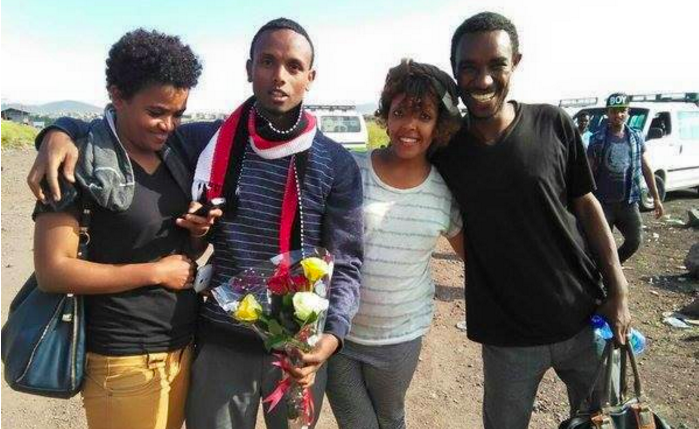
Zone9 members Mahlet (left) and Zelalem (right) rejoiced at the release of Befeqadu Hailu (second from left, in scarf) in October 2015. Photo shared on Twitter by Zelalem Kiberet.
Six members of the now liberated group made their premier international engagement in Ghana during FIFA conference: Atnaf Berhane, Befeqadu Hailu Techane, Zelalem Kibret, Natnael Feleke Aberra, and Abel Wabella were all in attendance. Jomanex Kasaye, who had worked with the group prior to the arrests (but was not arrested) also attended.
Several members had collaborated with Global Voices to write and translate stories into the Amharic. As members of the community, Global Voices campaigned and mobilised the global human rights community to speak out about their case from the very first night they were arrested.
After months of writing stories and promoting their case on Twitter, international condemnation of their arrest and imprisonment began to flow from governments and prominent human rights leaders, alongside hundreds of thousands of online supporters. From the four-compass points of the world, a mighty cry arose demanding the Ethiopian government to free the Zone9 bloggers.
In their remarks at FIFA, the bloggers said that their membership in the Global Voices community was key to visibility during their time in prison. In their panel session, they credited Global Voices’ campaign for keeping them alive.
Berhan Taye, the panel moderator, asked the group to recount their prison experiences. As they spoke, the lights on the stage dimmed. Their voices filled the room with a quiet power.
Abel Wabella, who ran Global Voices’ Amharic site, lost hearing in one ear due to the torture he endured after refusing to sign a false confession.
Atnaf Berhane recalled that one of his torture sessions lasted until 2 a.m. and then continued after he had a few hours of sleep.
One of the security agents who arrested Zelalem Kibret had once been Kibret’s student at the university where he taught.
Jomanex Kasaye recounted the mental agony of leaving Ethiopia before his friends were arrested — the anguish of powerlessness — the unending suspense and fear that his friends would not make it out alive.
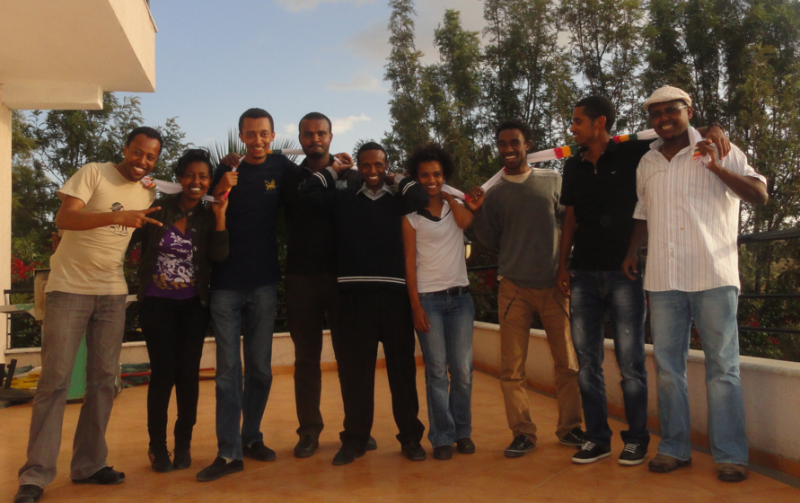
Zone9 bloggers together in Addis Ababa, 2012. From left: Endalk, Soleyana, Natnael, Abel, Befeqadu, Mahlet, Zelalem, Atnaf, Jomanex. Photo courtesy of Endalk Chala.
With modesty, the Zone9 bloggers said: “We are not strong or courageous people…we are only glad we inspired others.”
Yet, the Zone9 bloggers redefined patriotism with both their words and actions. It takes immense courage to love one’s country even after suffering at its hands for speaking out.
Ugandan journalist Charles Onyango-Obbo, also in attendance at FIFA, shared an Igbo proverb popularised by Nigerian writer Chinua Achebe which says:
Since the hunter has learned to shoot without missing, Eneke the bird has also learnt to fly without perching.
In essence, he meant that in order to keep digital spaces free and safe, those involved in this struggle must devise new methods.
Activists on the front lines of free speech in sub-Saharan Africa and across the globe cannot afford to work in silos or go silent in frustration and defeat. With our strength and unity, online spaces will remain free to deepen democracy through vibrant dissent.
Lessons on Flying from the Forum on Internet Freedom in Africa
By Jason Pielemeier |
“Since men have learned to shoot without missing, we have to learn to fly without perching” — African Proverb
By citing these words in his opening message, Dr. Wairagala Wakabi, the Executive Director of the Collaboration on International ICT Policy in East and Southern Africa (CIPESA), captured both the daunting reality and the irrepressible optimism surrounding the state of Internet freedom in Africa. This dynamic was also captured in Charles Onyango-Obbo’s keynote address, “Many African Governments Hate the Free Internet — And That Is A Very Good Thing.”
I was fortunate to represent the Global Network Initiative at the 5th Forum on Internet Freedom in Africa (FIFAfrica18) in Accra, Ghana from September 27–28, 2018. The event, co-hosted by CIPESA and the Ghana-based Media Foundation for West Africa (MFWA), featured a range of activists, academics, journalists, and government representatives from across the continent and the world discussing topics like censorship, big data, and gender-based violence online. While the topics were familiar to me, FIFAfrica18 offered a unique opportunity to hear fascinating African perspectives, narratives, and stories that are often absent from larger, more international Internet freedom conferences.
Over the two days, it became clear that while authoritarian governments in Africa may have come late to the Internet repression party, they are quickly catching up thanks to their own creative tactics, as well as foreign technology and knowledge transfer. As Onyango-Obbo noted in his keynote, African dictators are weaponizing the Internet for political purposes through the control and manipulation of a new digital bureaucracy (or as he calls it, the “digitocracy” and the “surveillance securitocracy”). Other speakers pointed out how anti-terrorism laws — sometimes left-over colonial versions, in other instances newer, Global War on Terror-inspired copies are being misused — to prosecute speech that should be protected. It was also pointed out that long legacies of information manipulation, combined with the fragility of the free press, have left many African countries susceptible to disinformation campaigns.
Other tactics are more creative. For instance, Tanzania and Uganda have pioneered taxes on social media and blogging respectively, which other governments are now seeking to replicate. And of course, when threatened, these regimes have not been afraid to order brute force network disruptions. Interestingly, the case was also made that the success that some repressive regimes are having with “fake news” may be leading them away from more scorched earth tactics like Internet shutdowns.
These efforts to clamp down on online freedom are often aided and abetted by technology and services procured from outside Africa. The role of China in financing and providing information and communication infrastructure that is perceived to facilitate state surveillance was a consistent topic across the sessions I attended. In addition, participants decried the increasing availability of more targeted hacking tools, peddled by Western and Israeli firms.
The combined power of these two forces — unreliable infrastructure and targeted hacking software — have been perhaps most prominently displayed by the government of Ethiopia, and FIFAfrica18 offered a fascinating opportunity to hear from the Zone 9 bloggers, a group of independent activists who were on the receiving end of their government’s oppression for several years until their recent release. Appearing as a group outside Ethiopia for the first time, the bloggers offered lessons from their experience, including the importance of solidarity, appreciation for support from activists abroad and diplomats at home, and gratitude to social media platforms for limiting the extent to which the government could persecute others in their networks. Perhaps more important though, was the inspiration they engendered through their ongoing commitment to continue to fight for human rights in Ethiopia and beyond.
Consistent with these notes of optimism and defiance were demonstrations of new tools like Netblock’s COST (Cost of Shutdowns Tool), which is already being used to underscore the disproportionate impacts of network disruptions in Chad and Ethiopia, and the power of collaborations like AccessNow’s #KeepItOn campaign. Building on the addition of several, new, Africa-focused members — CIPESA, Internet Sans Frontieres, and Paradigm Initiative– the Global Network Initiative hopes to do its part to harness this creative energy and facilitate new partnerships between the private sector and digital rights groups in Africa.
At the end of the day, the enduring commitment to freedom demonstrated by the Zone 9 bloggers, which was echoed across the Forum by brave journalists, committed activists, human rights commissioners, and others from Cameroon, Kenya, Zimbabwe and across Africa, that helped me understand and appreciate the intrepid spirit behind that admonition to learn to keep flying without perching, even if your wings grow tired.
Emerging Challenges and Data-driven Solutions for a Connected Future at FIFAfrica18
By Netblocks’ Writer |
At the 2018 Forum for Internet Freedom in Africa in Accra, Ghana, NetBlocks is demonstrating new tools and methodologies to defend human rights, empowering local communities and creating a space for open and progressive policies for internet access and telecommunications.
In a joint panel on data-driven advocacy on Friday, NetBlocks along with partners Access Now, CIPESA, the GNI and ISF, soft-launched the Cost of Shutdown Tool, an initiative supported by the Internet Society which enables participants to calculate the economic cost of internet shutdowns, network disruptions and platform blocking in sub-Saharan Africa. Economic arguments have proven to be an effective means to bolster the case for human rights online with a view to development and prosperity, a trend which is being recognised and made accessible to internet freedom campaigners by way of the new initiative.
Internet shutdowns & other connectivity restrictions have far-reaching impacts on internet users & society. This exciting tool from @netblocks estimates their economic cost: https://t.co/bQzDxdjFuC #KeepItOn
— Freedom on the Net (@freedomonthenet) September 28, 2018
The panel explored how communities have been adopting new tools and developing new workflows as part of the KeepItOn initiative to support internet freedom across the continent, documenting recent incidents of network disruptions during elections in Mali and in Chad, as well as collecting bodies of technical evidence around disruptions in Ethiopia and Cameroon at critical moments for democracy and society.
@netblocks and media freedom groups just demo-ed a cool” Cost of Shutdown” realtime tool that tracks internet shutdowns and their economic cost at #FIFAfrica18 #InternetFreedomAfricapic.twitter.com/lHNpk2mzIk
— Charles Onyango-Obbo (@cobbo3) September 28, 2018
Thursday saw the launch of the latest edition of The Internet Measurement Handbook, which provides civil society organisations and human rights defenders with practical technical and policy advice on managing internet disruptions, with a copy provided to each FIFAfrica participant.
NetBlocks director Alp Toker and advocacy manager Hannah Machlin demonstrated new internet freedom measurement techniques which present a more accurate, live view of emerging network incidents. Demonstrations and workshops provided a hands-on introduction to real-time internet freedom monitoring, web probes and internet-scale visualisation, which are now being adopted across the continent and globally as part of the internet observatory project.
@netblocks present tools to measure #InternetShutDowns at the #FIFAfrica18. #KeepItOn#InternetFreedomAfrica pic.twitter.com/50EAmDqRcL
— Emmanuel Vitus (@emmavitus) September 29, 2018
Working with other civil society groups, the team explored issues around internet governance, internet protocols and their impact on human rights, free expression and trade, producing a series of new alliances and partnerships to strengthen digital rights and protect the integrity of elections regionally and worldwide.
Check @netblocks – keeping the internet on 💪🏽💪🏽
A key player in #InternetFreedomAfrica
Exhibiting at #FIFAfrica18 #ChangeAfrica pic.twitter.com/JnyQ4CNU5F— Maria Sarungi Tsehai (@MariaSTsehai) September 28, 2018
Connecting data and human rights
Sessions over the course of three days have helped build a bridge between technical work to track restrictions on free expression online, connecting the personal experiences of victims of human rights violations with policy makers, governments and ICT industry stakeholders.
“Just two weeks ago the internet in #Ethiopia was shut down and thousands were arrested and taken to military camps” explain @zone9ners at #FIFAfrica18. Matches technical evidence we collected of mobile cell disruptions in Addis #KeepItOn pic.twitter.com/J09E5gRwBB
— NetBlocks.org (@netblocks) September 27, 2018
About FIFAfrica
Organised by the Collaboration for International ICT Policy in East and Southern Africa (CIPESA) in partnership with the Media Foundation West Africa (MFWA) the 2018 edition of the Forum on Internet Freedom in Africa takes place on 26-28 September 2018 in Accra, Ghana.
The Forum is a landmark event that convenes various stakeholders from the internet governance and online rights arenas in Africa and beyond to deliberate on gaps, concerns and opportunities for advancing privacy, access to information, free expression, non-discrimination and the free flow of information online on the continent.
With strategic linkages to other internet freedom forums and support for the development of substantive inputs to inform the conversations on human rights online happening at national level, at the African Union and the African Commission on Human and People’s Rights (ACHPR), the African Internet Governance Forum (IGF), subregional IGFs, the global IGF, Stockholm Internet Forum (SIF), the Internet Freedom Festival (IFF), the Internet Freedom Forum (Nigeria) and RightsCon, among others, FIFAfrica provides a pan-African space where discussion from these other events can be consolidated at continent-wide level, drawing a large multistakeholder audience of actors.
Check out this AMAZING new tool created by @netblocks based on a @cipesaug methodology that estimates the cost of an internet shutdown has in a given country or region — https://t.co/ZDJDe1HyCx#FIFAfrica18 #keepiton #netdemocracy #digitalrights #netfreedom #mediadev
— Daniel O’Maley (@domaley) September 28, 2018

